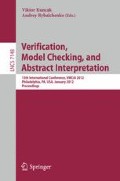Abstract
In this paper, we present an extension of active automata learning to register automata, an automaton model which is capable of expressing the influence of data on control flow. Register automata operate on an infinite data domain, whose values can be assigned to registers and compared for equality. Our active learning algorithm is unique in that it directly infers the effect of data values on control flow as part of the learning process. This effect is expressed by means of registers and guarded transitions in the resulting register automata models. The application of our algorithm to a small example indicates the impact of learning register automata models: Not only are the inferred models much more expressive than finite state machines, but the prototype implementation also drastically outperforms the classic L * algorithm, even when exploiting optimal data abstraction and symmetry reduction.
This work is supported by the European FP 7 project CONNECT (IST 231167).
Access this chapter
Tax calculation will be finalised at checkout
Purchases are for personal use only
Preview
Unable to display preview. Download preview PDF.
References
Aarts, F., Jonsson, B., Uijen, J.: Generating Models of Infinite-State Communication Protocols Using Regular Inference with Abstraction. In: Petrenko, A., Simão, A., Maldonado, J.C. (eds.) ICTSS 2010. LNCS, vol. 6435, pp. 188–204. Springer, Heidelberg (2010)
Ammons, G., Bodik, R., Larus, J.: Mining specifications. In: Proc. 29th ACM Symp. on Principles of Programming Languages, pp. 4–16 (2002)
Angluin, D.: Learning regular sets from queries and counterexamples. Information and Computation 75(2), 87–106 (1987)
Berg, T., Jonsson, B., Raffelt, H.: Regular Inference for State Machines Using Domains with Equality Tests. In: Fiadeiro, J.L., Inverardi, P. (eds.) FASE 2008. LNCS, vol. 4961, pp. 317–331. Springer, Heidelberg (2008)
Broy, M., Jonsson, B., Katoen, J.-P., Leucker, M., Pretschner, A. (eds.): Model-Based Testing of Reactive Systems. LNCS, vol. 3472. Springer, Heidelberg (2005)
Cassel, S., Howar, F., Jonsson, B., Merten, M., Steffen, B.: A Succinct Canonical Register Automaton Model. In: Bultan, T., Hsiung, P.-A. (eds.) ATVA 2011. LNCS, vol. 6996, pp. 366–380. Springer, Heidelberg (2011)
Clarke, E.M., Grumberg, O., Peled, D.: Model Checking. MIT Press (1999)
Ernst, M.D., Perkins, J.H., Guo, P.J., McCamant, S., Pacheco, C., Tschantz, M.S., Xiao, C.: The Daikon system for dynamic detection of likely invariants. Science of Computer Programming 69(1-3), 35–45 (2007)
Hagerer, A., Hungar, H., Niese, O., Steffen, B.: Model Generation by Moderated Regular Extrapolation. In: Kutsche, R.-D., Weber, H. (eds.) FASE 2002. LNCS, vol. 2306, pp. 80–95. Springer, Heidelberg (2002)
Howar, F., Steffen, B., Merten, M.: Automata Learning with Automated Alphabet Abstraction Refinement. In: Jhala, R., Schmidt, D. (eds.) VMCAI 2011. LNCS, vol. 6538, pp. 263–277. Springer, Heidelberg (2011)
Huima, A.: Implementing Conformiq Qtronic. In: Petrenko, A., Veanes, M., Tretmans, J., Grieskamp, W. (eds.) TestCom/FATES 2007. LNCS, vol. 4581, pp. 1–12. Springer, Heidelberg (2007)
Hungar, H., Niese, O., Steffen, B.: Domain-Specific Optimization in Automata Learning. In: Hunt Jr., W.A., Somenzi, F. (eds.) CAV 2003. LNCS, vol. 2725, pp. 315–327. Springer, Heidelberg (2003)
Jonsson, B., Parrow, J.: Deciding bisimulation equivalences for a class of non-finite-state programs. Information and Computation 107(2), 272–302 (1993)
Kaminski, M., Francez, N.: Finite-memory automata. Theoretical Computer Science 134(2), 329–363 (1994)
Lo, D., Maoz, S.: Scenario-based and value-based specification mining: better together. In: 25th IEEE/ACM Int. Conf. on Automated Software Engineering, ASE 2010, Antwerp, Belgium, pp. 387–396. ACM (2010)
Lorenzoli, D., Mariani, L., Pezzè, M.: Automatic generation of software behavioral models. In: Proc. ICSE 2008: 30th Int. Conf. on Software Enginering, pp. 501–510 (2008)
Mariani, L., Pezzé, M.: Dynamic detection of COTS components incompatibility. IEEE Software 24(5), 76–85 (2007)
Merten, M., Steffen, B., Howar, F., Margaria, T.: Next Generation LearnLib. In: Abdulla, P.A., Leino, K.R.M. (eds.) TACAS 2011. LNCS, vol. 6605, pp. 220–223. Springer, Heidelberg (2011)
Rivest, R.L., Schapire, R.E.: Inference of finite automata using homing sequences. Information and Computation 103(2), 299–347 (1993)
Saint-Andre, P.: Extensible Messaging and Presence Protocol (XMPP): Instant Messaging and Presence. RFC 6121 (Proposed Standard) (March 2011)
Sakamoto, H.: Learning Simple Deterministic Finite-Memory Automata. In: Li, M. (ed.) ALT 1997. LNCS, vol. 1316, pp. 416–431. Springer, Heidelberg (1997)
Shu, G., Lee, D.: Testing security properties of protocol implementations - a machine learning based approach. In: Proc. ICDCS 2007, 27th IEEE Int. Conf. on Distributed Computing Systems, Toronto, Ontario. IEEE Computer Society (2007)
Steffen, B., Howar, F., Merten, M.: Introduction to Active Automata Learning from a Practical Perspective. In: Bernardo, M., Issarny, V. (eds.) SFM 2011. LNCS, vol. 6659, pp. 256–296. Springer, Heidelberg (2011)
Tretmans, J.: Model-Based Testing and Some Steps towards Test-Based Modelling. In: Bernardo, M., Issarny, V. (eds.) SFM 2011. LNCS, vol. 6659, pp. 297–326. Springer, Heidelberg (2011)
Wolper, P.: Expressing interesting properties of programs in propositional temporal logic (extended abstract). In: Proc. 13th ACM Symp. on Principles of Programming Languages, pp. 184–193 (January 1986)
Author information
Authors and Affiliations
Editor information
Editors and Affiliations
Rights and permissions
Copyright information
© 2012 Springer-Verlag Berlin Heidelberg
About this paper
Cite this paper
Howar, F., Steffen, B., Jonsson, B., Cassel, S. (2012). Inferring Canonical Register Automata. In: Kuncak, V., Rybalchenko, A. (eds) Verification, Model Checking, and Abstract Interpretation. VMCAI 2012. Lecture Notes in Computer Science, vol 7148. Springer, Berlin, Heidelberg. https://doi.org/10.1007/978-3-642-27940-9_17
Download citation
DOI: https://doi.org/10.1007/978-3-642-27940-9_17
Publisher Name: Springer, Berlin, Heidelberg
Print ISBN: 978-3-642-27939-3
Online ISBN: 978-3-642-27940-9
eBook Packages: Computer ScienceComputer Science (R0)

